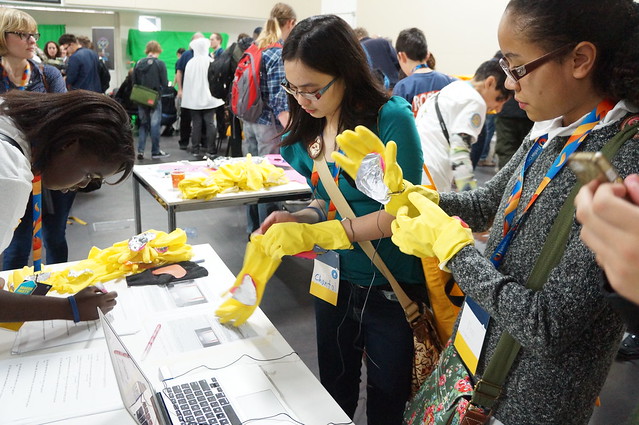Later this month, Mozilla joins local educators and community sponsors from central Virginia to support SPARK, a two-day hackathon for fifty young people interested in problem-solving with technology. Day one begins with a ‘learnathon’ of STEM workshops on topics like agile development, design thinking, and web literacy. There’s a break in the action mid-afternoon when sponsors, like Mozilla, pitch problems for participants to solve using their leveled-up skills from the learnathon. That evening, attendees split into teams and begin brainstorming solutions to their adopted problems before calling it quits for the night.

Youth hacking on wearable sensors, CC-BY-SA Hive NYC
On day two, teams reassemble to iterate and test solutions until it’s time for the closing ‘Presentation expo,’ a celebration and exhibition like the MozFest Science Fair.
Inspired by the Royal Foundation’s conservation-themed Minecraft mod #wearetherangers, and by Hive NYC’s Hunger Games-themed Hungercraft events, the Mozilla Foundation is sponsoring a problem called “Fight for the Open Web.” Here’s a bit of the pitch:
…what would Minecraft be like without the Open Web? What if there wasn’t a way to get online or share your adventures, maps, mods, and servers with others? What if a company shut Minecraft’s doors to anyone who couldn’t pay an extra free (or who wouldn’t accept ads in their dungeons) for every block they mined, message they typed, or skin they downloaded? What if Minecraft was only for YouTubers with at least 100,000 subscribers and a dozen sponsors? What would Minecraft be like on the ‘Closed Web?’
After you adopt this problem, you’ll research the Open Web and then design prototypes of game assets for a map, mod, and/or resource pack called, ‘Fight for the Open Web.’ The big idea is to represent the Open Web inside Minecraft and to use the game as a tool for teaching others about how the web works through adventure, exploration, narrative, and play.
Minecraft is not only a massive online, global community – it’s an educational juggernaut that spirals players through learning basic recipes for in-game survival through setting up and modding servers that greatly add to or alter the course of normal play. It’s a deeply responsive educational platform that rewards exploration and graduating to new levels of play and meta-play that can involve manipulating the game’s code, itself.
Even as we develop a dynamic web literacy curriculum with a distinctive, participatory, and Mozilla-like style, it’s important to acknowledge and employ other web literacy technologies, like Minecraft, that engage countless users in learning through online community and game-play experiences across all types of devices. We want to go where our users are. We want to teach and learn with them in ways that are locally and individually relevant to their interests and affinities. Our SPARK hackathon sponsorship gives us the chance to do just that.
Working with local partners in central Virginia and teenage designers and developers from area schools, we’re going to start learning what’s possible in community co-design around a Minecraft experience that teaches players what’s at stake when we fight for the Open Web IRL. What does open mean to you? What does the web look like in your eyes? What makes for a compelling, game-based call-to-action in defense of a web that should remain a public resource open to all?
We don’t know how all of this looks to the next generation of web citizens, but by working alongside them through events like SPARK we plan to prototype and share increasingly dynamic, interactive, and relevant web literacy experiences that surpass our own notions of curriculum and our own place in time.
Look for an update – a lots of inspiration – soon!